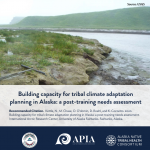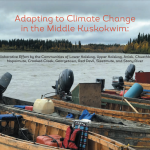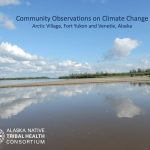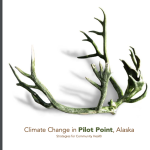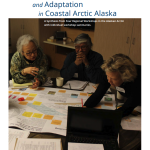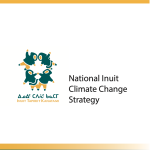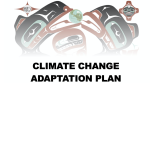Atmosphere
Building Capacity for Tribal Climate Adaptation Planning in Alaska
The Alaska Native Tribal Health Consortium (ANTHC) and Institute for Tribal Environmental Professionals (ITEP) provided 3 tribal climate adaptation planning trainings in Alaska from 2016 to 2017 (two jointly sponsored trainings in 2016 and 2017 and a 2017 training sponsored by ANTHC). This report summarizes findings from a web-based questionnaire distributed to tribal participants who attend these trainings to understand what additional resources and support they want to help their climate adaptation planning eforts. Findings are based on the analysis of 21 responses.
Adapting to Climate Change in the Middle Kuskokwim
In 2018, the Georgetown Tribal Council received a Bureau of Indian Affairs Tribal Resiliency Program Grant to create a climate vulnerability assessment and adaptation plan for the Middle Kuskokwim region. The Alaska Native Tribal Health Consortium (ANTHC) was contracted to facilitate the climate change adaptation planning process, and develop the final climate change vulnerability assessment and adaptation plan in collaboration with the communities of Lower Kalskag, Upper Kalskag, Aniak, Chuathbaluk, Napaimute, Crooked Creek, Georgetown, Red Devil, Sleetmute, and Stony River.
Community Observations on Climate Change: Arctic Village, Fort Yukon and Venetie, Alaska
For the Upper Yukon area, climate change has become a daily fact of life, causing a wide range of impacts to the environment, and in some cases to community health. In 2015 the Alaska Native Tribal Health Consortium (ANTHC) and the U.S. Geological Survey (USGS) organized a climate change impacts assessment in Arctic Village, Fort Yukon, and Venetie.
Climate Change in Pilot Point, Alaska: Strategies for Community Health
In the Yupik and Aleut community of Pilot Point residents report changes to the weather, landscape, plants and wildlife. Extreme weather events are thought to be more common, the timing of seasons is more unpredictable, erosion to shorelines is occurring at a rapid rate, and consequentially, vulnerability to flooding is increasing. Identified health concerns include food security, damage to health-critical infrastructure, injury and behavioral health issues related to extreme and unusual weather conditions.
Climate Change in Kivalina, Alaska: Strategies for Community Health
There are many uncertainties about the future of Kivalina, but it is obvious that climate change is resulting in serious health challenges that need to be addressed. It is hoped that this report will facilitate informed decision making, and the development of adaptive measures that encourage a sustainable and healthy future for Kivalina and other communities in the Northwest Arctic region.
Promoting Resilience and Adaptation in Coastal Arctic Alaska
This synthesis represents a summary of conversations during four workshops held in regional hub communities of Nome, Unalaska, King Salmon and Kotzebue. Over six months in 2016, almost 200 participants from 34 tribes, 14 state and federal agencies, local communities as well as several research institutions and nongovernmental organizations shared their insights on the most urgent risks and vulnerabilities for coastal communities and resources. They also identified key opportunities for collaboration between communities and agencies
Oscarville Tribal Climate Adaptation Plan
Pektayiinata = We are Resilient
National Inuit Climate Change Strategy
Inuit Nunangat is recognized as a global climate change hotspot, garnering national and global concern. We continue to emphasize that no one is more aware or concerned about the changes taking place in our homelands and their consequences than Inuit, as evidenced by our strident and effective advocacy for global action on climate change over the last three decades. We have an intimate understanding of how climate change is impacting the physical environment, and the wildlife and ecosystems that sustain us
Climate Change Adaptation Plan
"Tlingit & Haida has worked to determine what changing climate conditions will occur in southeast Alaska and potentially affect all southeast Tribes; and prioritized each area of concern with a ranking based off of vulnerability and importance to the citizens and culture alike."
